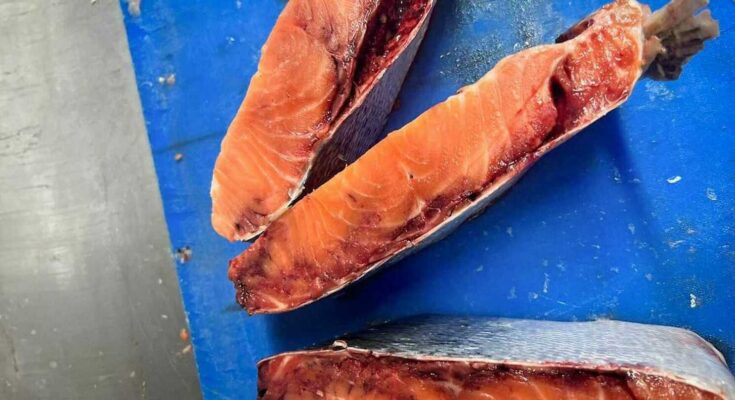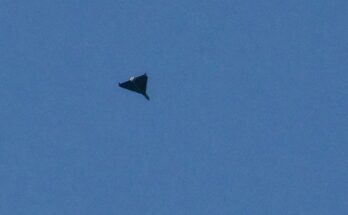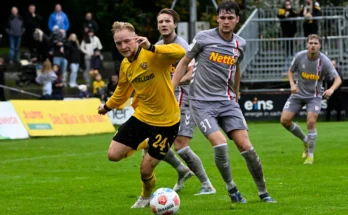Lhe salmon, Norway’s emblematic fish, a highlight of European tables, is currently navigating troubled waters following a harrowing documentary series, Lakselandet (literally “land of salmon”), broadcast since November 4 by the Norwegian public channel NRK.
Salmon farming is a fast-growing industry, which is the second source of income for the Scandinavian kingdom after oil and gas, with 10.45 billion euros exported worldwide in 2024, which is a record. But behind this global success and apparent prosperity lies an unpleasant reality, according to this investigative survey, that risks tarnishing the reputation of the country’s economic mainstay, which was already hit hard in 2013 by the pesticide-contaminated salmon scandal.
The NRK report revealed a new scandal, namely the illegal export of salmon to Europe characterized by cuts and sores on the skin. As the world’s leading exporter with production of 1.2 million tons last year, Norway has implemented strict rules to guarantee the quality and reputation of salmon, and prohibits the export of fish in poor condition.
“Previously, maybe one in a thousand fish had skin lesions”
These fish must be sent to approved processing centers to be cleaned of wounds before being exported as fillets, steaks and other ground fish. But some exporters and traders are ignoring the ban, as seen by NRK’s investigation into a salmon factory in Europe whose location and name have not been disclosed. To obtain testimony from the factory, NRK agreed to remain anonymous and not reveal the identity of the supplier of the illegally exported salmon.
“When we opened the box, the packaging looked perfect. But when we took the fish out for inspection, we immediately saw there were open wounds that could potentially harbor bacteria,” said an employee. “We can’t send this to customers. We can’t send this to anyone,” he said, showing salmon damaged by mistreatment. During filming, several semi-trailers unloaded fish from five different production sites, large and small, in Norway.
Over two days, randomly selected chests were opened in the presence of NRK journalists. “In almost all of these places, salmon labeled as superior or standard quality are injured and are not allowed to cross the Norwegian border,” said one employee. “We don’t know what the word ‘norm’ means anymore,” said another, adding that “this wasn’t the case ten years ago.” “Previously, maybe one in a thousand fish had skin lesions. Now, we find them in almost all shipments, even in fish considered “superior quality,” he said.
Professional organizations are challenged
In its investigation, NRK was able to identify only one trader, the North Tandem company in Bergen, which for several years sold injured salmon to Ashrafov, an importer in Kazakhstan. “The director of North Tandem offered us poor quality fish. We accepted it because it was cheap and smokers in our hometown asked for it,” he explained in a video with NRK showing photos of fish in poor condition.
Seeing these images, the Norwegian Food Safety Authority stated clearly: “This salmon must not be consumed. » Faced with these shocking revelations, the Minister of Fisheries Labor, Marianne Sivertsen Næss, called aquaculture professionals to a meeting on this matter. “Those involved in the sector are fully responsible for complying with the regulations in force. “The fact that some people choose to violate it is unacceptable,” he said in a press release.
When asked, the Norwegian Seafood and Seafood Companies professional organizations considered it positive if legal violations were revealed. “If you sell a product with a gold standard when it is not, you damage the reputation of Norwegian salmon. We take this very seriously,” Geir Ove Ystmark, CEO of Seafood Norway, the largest trade organization in the sector, told NRK.
“It is these actors that we must investigate and act on”
The situation requires “decisive action against these illegal exports and immediate action from the government,” added Robert H. Eriksson, director of Sjømatbedriftene (Seafood Company). “We cannot accept unscrupulous individuals who undermine confidence in Norwegian salmon,” he wrote on the organization’s website, pointing the finger at salmon exporters and traders who “deliberately violate regulations.”
To find
Kangaroo today
Answer
“It is these actors that we must investigate and act on,” he added, lamenting “the lack of adequate controls and the absence of sanctions.” In fact, only rare cases are reported to the police and customs services. The resounding success of Norway’s fish farming superpower is at risk of being impacted by a new scandal that has amplified the flood of criticism from environmental and animal welfare advocates against intensive fish farming.
This leads to the death of 57.8 million salmon by 2024 (15.4% of farms) due to stress, bacterial infections, and injuries caused by treatment for lice, parasites that feed on salmon skin and weaken their immune systems, according to the Norwegian Veterinary Institute.



